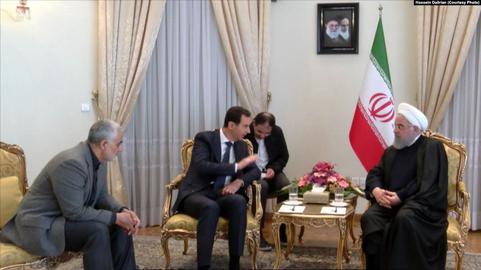A newspaper has been temporarily banned after publishing a photograph of the controversial surprise meeting between Syrian president Bashar al-Assad and Iranian leaders, along with the bold headline “The Uninvited Guest.”
On February 26, the front page of Ghanoon newspaper featured a photograph of Syrian President Bashar al-Assad and Ayatollah Khamenei embracing. Also in the photograph were President Hassan Rouhani and General Ghasem Soleimani, commander of the expeditionary Quds Force. Foreign Minister Mohammad Javad Zarif did not appear in the photograph, because he had not been invited to the meeting. Later that night, Zarif tendered his resignation. As one website reported, “After the photographs of today’s meeting, Zarif said that he no longer has any credit in the world as foreign minister” [Persian link].
According to Ghanoon [Persian link], during the meeting Ayatollah Khamenei praised Assad as the “hero of the Arab world” who has given the “resistance” more power and more prestige. “As in the past, the Islamic Republic of Iran will stand by the Syrian nation,” Khamenei was quoted as saying, “because it will help the resistance movement.” The Supreme Leader also prayed for the victory of the Syrian nation and the health of Assad and his family, Ghanoon reported.
“Syrian President Bashar al-Assad praised the generous Iranian help to his country," the paper reported, and quoted Assad as saying that "war in Syria was like the unjust eight-year [Iran-Iraq] war."
"The Islamic Republic selflessly stood by us in this situation and I must congratulate your excellency and all Iranians for this success and express my gratitude,'” Assad said.
As with all newspapers published in Iran, throughout its report, Ghanoon referred to Khamenei with all the required honorifics. Nevertheless, the paper received a warrant from the Culture and Media Court that ordered it to stop publication. According to the Iranian Students News Agency (ISNA), the warrant was issued “in accordance with Article 576 of the Islamic Penal Code to prevent commitment of a crime by imposing a temporary ban.”
However, Article 576 [PDF] actually refers to something quite different. It says: “If any official and civil servant and governmental and municipal agent, no matter at which level or office he serves, abuses his authority and refuses to obey written state orders or statutes or decisions or orders of judicial authorities or any other orders issued by lawful officials, he shall be sentenced to dismissal from civil service for one to five years.”
Sarcasm Not Allowed when it Comes to the Supreme Leader
IranWire spoke to a former judge for the Press Court about the case.“The warrant should have cited one of the articles of the Press Law,” he said. But he believes that, in any case, if Ghanoon’s headline had referred only to a meeting between Rouhani and Assad, then most probably nothing would have happened — it is only when a story involves the Supreme Leader that sensitivities arise. “They did not take the headline as an insult to the Supreme Leader; otherwise they would have voided the paper’s publication permit,” the former judge said. “In any case, the ‘Uninvited Guest’ is a sarcastic title and the newspaper was banned temporarily because the headline was superimposed onto a picture of the Supreme Leader. What is more, Bashar al-Assad was Ayatollah Khamenei’s special guest and they [the Culture and Media Court officials] did not appreciate the paper using this title for him.”
Ghanoon has faced bans before. On June 20, 2016, it was ordered to cease publication after the Revolutionary Guards filed a complaint against it in connection with an article about the treatment of 10 US Navy sailors who were arrested by the Guards when their two small boats drifted into Iranian waters. The article claimed that the way the sailors were forced to kneel bore resemblance to how ISIS treated its captives. The Revolutionary Guards certainly opposed to that piece of commentary, whether sarcastic or not.
visit the accountability section
In this section of Iran Wire, you can contact the officials and launch your campaign for various problems

























comments